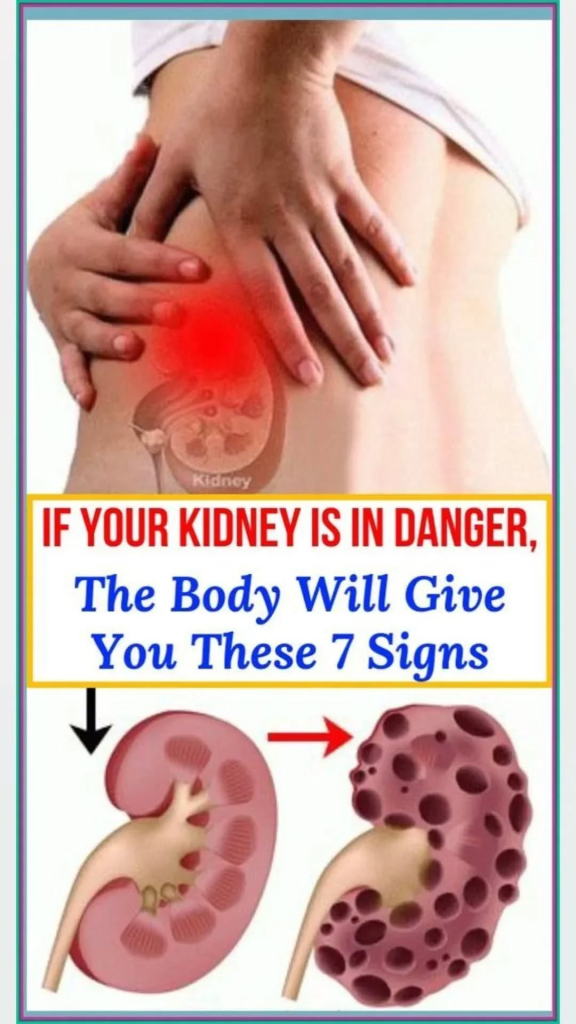
If Your Kidneys Are in Danger, Your Body Will Give You These 7 Warning Signs
Your kidneys play a vital role in keeping your body healthy — they filter waste, balance fluids, regulate blood pressure, and keep your blood clean. But when your kidneys start to fail, the symptoms often go unnoticed until the damage becomes severe. Knowing the early signs of kidney trouble could save your life.
Here are 7 important warning signs your body gives when your kidneys may be in danger:

1. Changes in Urination
The kidneys are responsible for producing urine, so any changes in your urinary habits may be a red flag. Watch for:
- Frequent urination, especially at night
- Foamy or bubbly urine
- Blood in the urine
- Dark or very pale urine
- Difficulty urinating or feeling pressure
These can all indicate that your kidneys are struggling to do their job properly.
2. Persistent Swelling in Ankles, Feet, or Hands
Kidneys regulate fluid balance. If they aren’t working properly, your body may start retaining water, leading to visible swelling — especially in the:
- Ankles
- Feet
- Legs
- Hands
This is known as edema and is a common symptom of declining kidney function.
3. Fatigue and Weakness
Healthy kidneys produce a hormone called erythropoietin, which signals your body to make red blood cells. When the kidneys fail, this process slows, leading to anemia.
Low red blood cell count causes:
- Constant tiredness
- Muscle weakness
- Dizziness
- Trouble focusing
If you feel unusually drained, don’t ignore it.
4. Skin Rashes and Itching
When the kidneys can’t filter toxins properly, waste builds up in your blood, causing:
- Dry, itchy skin
- Rashes
- Skin that feels irritated or inflamed
If you’re using lotion and your skin is still extremely itchy, your kidneys may be the hidden cause.
5. Shortness of Breath
Excess fluid in the body due to kidney failure can accumulate in the lungs, making it harder to breathe. Also, low red blood cell count reduces the oxygen supply to your body.
If you notice:
- Difficulty breathing after mild activity
- Chest tightness
- Wheezing without a cold
— get checked for potential kidney issues.
6. Metallic Taste in the Mouth and Bad Breath
Uremia (buildup of waste in the blood) affects your taste and smell. This can cause:
- A metallic taste in the mouth
- Persistent bad breath
- Loss of appetite
If food suddenly tastes different or you’re repelled by meat or protein-rich meals, this may be a signal from your kidneys.
7. Nausea and Vomiting
Toxin accumulation can upset your digestive system. You may experience:
- Nausea without explanation
- Vomiting
- Stomach cramps
- Loss of appetite or weight
These are often mistaken for digestive issues, but the root cause might be kidney-related.
When to See a Doctor
If you experience two or more of these symptoms regularly, don’t wait. Early detection can slow or even reverse kidney damage. Your doctor may recommend:
- A blood test (creatinine, BUN, eGFR)
- Urinalysis
- Imaging tests
- Blood pressure check
The earlier kidney issues are found, the better your chances of preventing serious complications like chronic kidney disease or kidney failure.
Final Thoughts
Your kidneys are silent workers — they rarely show obvious symptoms until the damage is serious. But your body does send signals. Pay attention to these 7 signs and take action early. Drink enough water, manage your blood pressure and sugar, avoid overuse of painkillers, and listen to your body.
Your health starts with awareness.